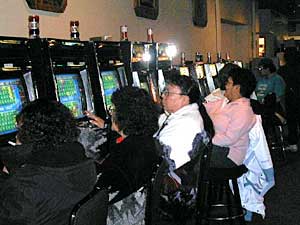|
Audio
Photos
More from MPR
Your Voice
|
Landscape changing in Indian gaming relationship with state
September 9, 2004
Indian casinos in Minnesota generate more than $1 billion a year in revenue. But most of those profits are earned by tribes close to the Twin Cities. Rural reservations have struggled. For three years, tribal leaders from the White Earth and Red Lake Chippewa bands in northern Minnesota have tried to convince lawmakers to level the playing field. They want to create a metro-area casino that would share profits with the state. That plan could soon get a boost. Tribal leaders on the Leech Lake Reservation once opposed a joint casino venture with the state. Now they say they want to join the effort.
Bemidji, Minn. — For years, the Leech Lake Band of Chippewa has aligned itself with the nine tribes that make up the Minnesota Indian Gaming Association. The association has been unwaivering in its refusal to renegotiate its gaming compacts with the state.
The organization has also lobbied hard against the Red Lake-White Earth Twin Cities casino project. Now, Leech Lake leaders appear to have reversed course.
 | |||
"You know, there's some political clout there," said George Goggleye, newly elected chairman of the Leech Lake Band.
Goggleye says Leech Lake's participation in the Twin Cities casino project will probably be announced on the steps of the state Capitol later this month. He says it could change the landscape of Indian gaming in Minnesota.
"When you add Leech Lake to the equation, along with Red Lake and White Earth, we represent about 85 percent of the Native American population in Minnesota," Goggleye said. "It puts us on an equal playing field with anybody, and that includes the state. So that's kind of why we're interested. It's going to be a benefit to our people."
Goggleye says Indian casinos in northern Minnesota have created lots of jobs, but not much wealth. Leech Lake is struggling with an $11 million deficit. At the same time, the tribal population on Leech Lake has grown by a third in just 10 years.
|
At some point in Minnesota, gaming is going to expand. And tribes need to be at the table.
- Erma Vizenor, White Earth chairwoman |
He says profits from a state-tribal casino would generate millions of dollars each year for the state and the three tribes. Goggleye says that money could help Leech Lake meet growing social needs. It could also be used to buy more land.
"The Leech Lake Reservation land base is only about five percent of what we call Leech Lake," he said. "Right now we have a lot of tribal members coming home, looking for suitable land to build homes on. A lot of that money would be channeled into land acquisition."
The state-tribal casino partnership idea originated about four years ago with leaders on the White Earth Reservation. Erma Vizenor was secretary-treasurer at the time. She's now White Earth's tribal chair.
 | |||
"We at White Earth knew that at some point in the future the state of Minnesota would be looking at Indian gaming and certainly, at least with state deficits as they are, the handwriting was on the wall," said Vizenor. "At some point in Minnesota, gaming is going to expand, and tribes need to be at the table."
Other bands, too, have indicated recently they may be willing to share casino profits with the state. Leaders of the successful Mille Lacs Band have suggested a series of joint ventures with the state, including sports betting and new casino games.
State officials welcome the new proposals from Indian Country. House Speaker Steve Sviggum (R-Kenyon) says it's only a matter of time before either tribes give more money to the state, or the state authorizes non-tribal casinos.
 | |||
"I believe next year will be the year that something will be addressed in the form of gaming, one way or another," said Sviggum. "Whether it be renegotiation of the compact or whether it be additional gaming opportunities, private and maybe even in one way involving Red Lake and White Earth. I believe that the pressure is building from a number of avenues."
Tribal officials across Minnesota largely reject any talk of renegotiating their gaming compact. The agreement signed 15 years ago has no end-date and does not require tribes to share revenue with the state.
But state officials say the new tribal proposals are significant. They say it means the state could negotiate with one tribe at a time, rather than deal with the complexity of a multi-tribe compact. Observers say they expect more tribes to come forward with revenue sharing proposals, in exchange for a continued tribal monopoly on casino gambling.
|
News Headlines
|
Related Subjects
|

